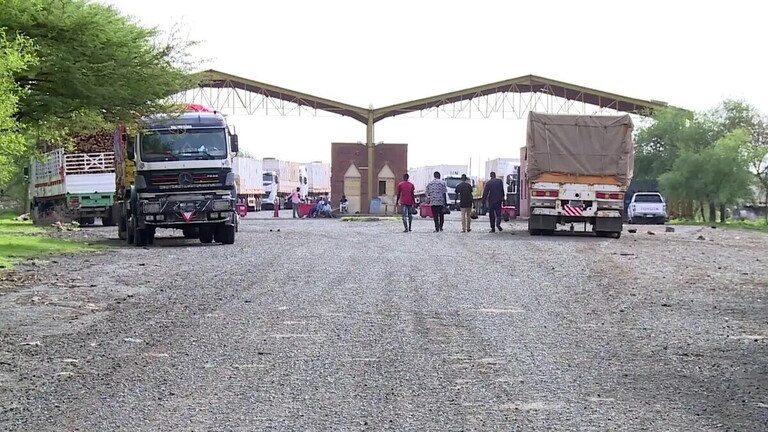On August 3, the Sudanese authorities in the state of Gedaref made an official announcement asserting the closure of the “Qalabat” border crossing with Ethiopia. This decision was prompted by the ongoing armed conflicts in the neighboring Bahir Dar region between the Amharic “Fanu” militia, the “Leo Haile” special forces, and the Ethiopian army. The closure of the border crossing signifies the concerns of Sudan regarding the potential escalation of armed confrontations along the Ethiopia-Sudan border. This development is particularly significant as the Sudanese army is currently engaged in armed conflicts with the Rapid Support Forces.
The Sudanese authorities are apprehensive about the potential efforts of the Amharic militia to regain control of the Al-Fashqa area and exploit the Sudanese army’s involvement in the conflict with the Rapid Support Forces to accomplish this objective. Numerous reports indicate that the “Fanu” militia and the “Liyohaili” forces have successfully seized control of the Amharic Marawi region. Meanwhile, armed confrontations with the Ethiopian army forces in the Azuzu region, situated between Bahir Dar province and the city of Qandar, are still ongoing. It is expected that these confrontations will persist in the upcoming phase, particularly following Ethiopia’s accusation on August 7, asserting that the “Fano” militia is actively working towards overthrowing the local government in Amhara and the central government in Addis Ababa.
Motives Behind the Shift in Stances
The decision made by the Sudanese authorities to expeditiously close the “Qallabat” border crossing with Ethiopia can be attributed to various factors, with the most significant being:
1- Repercussions of the conflict between the Ethiopian government and the militias: The magnitude of the violent confrontations involving sophisticated weaponry escalated between the armed Amharic “Fano” militia and the “Leohali” special forces, on one side, and the Ethiopian army, on the other, particularly in the Bahir Dar region situated within the Ethiopian Amhara region. Notably, the “Fano” militia has proclaimed a state of mobilization and heightened readiness to sustain the battle, effectively blockading all routes leading to the capital, Addis Ababa. This indicates their apparent preparation for an extended phase of conflict against the central government.
The confrontations witnessed a surge following the Ethiopian government’s implementation of a policy to merge all regional special forces into the Ethiopian army, while simultaneously labeling Fanu as a rebellious militia that disrupts regional stability. Consequently, the authorities in Gedaref State, Sudan, have voiced apprehension regarding the ongoing operation of the crossing, as it may facilitate the infiltration of armed factions into Sudanese territory. This, in turn, would create a fresh battleground along the Sudanese border, exacerbating the already escalating armed clashes between the Sudanese army forces and the Rapid Support Forces.
In this particular context, Maj. Gen. Mudassir Hassab al-Rasoul, the Director of Gedaref State Police, emphasized the significance of suspending land travel procedures at the Qalabat crossing. This measure aims to safeguard the well-being of both citizens and foreign individuals who are in transit to Ethiopia. Furthermore, Maj. Gen. al-Rasoul highlighted that the Ethiopian consulate and relevant authorities have been duly informed about this decision to ensure its implementation. This presents an opportunity for the authorities to effectively manage the prevailing unrest in the Bahir Dar region, which shares a border with Gedaref state.
2- Fano’s endeavors to exert control over the Al-Fashqa region have been widely reported, indicating the militia’s movements in the area without the knowledge or authorization of the Ethiopian authorities. Exploiting the ongoing armed conflicts between the Sudanese army forces and the Rapid Support Forces within Sudan, the militia seeks to establish a foothold in this territory.
Furthermore, as the Sudanese army has recently redeployed some of its forces from the border to engage in combat with the Rapid Support Forces near the capital, it is highly probable, as suggested by multiple sources, that the “Fano” militia will exploit this situation to infiltrate the borders and regain control over the region. Subsequently, they will persist in their resistance against the Ethiopian forces stationed there.
The dispute between the government and the militia regarding the territorial status of the Ethiopian lands neighboring the Al-Fashqa region can be identified as a significant factor contributing to the persistent conflict. Former Prime Minister Meles Zenawi’s administration made the decision to incorporate these lands into the Tigray region, a move that was met with opposition from the “Fano” militia in Amhara, who maintain that these lands rightfully belong to their territory.
3- The Ethiopian Perspective on the Sudanese Conflict: Numerous reports indicate that the Sudanese army leadership is deeply concerned about Ethiopia’s stance towards the protracted armed conflict in Sudan, which is entering its fifth month in mid-August. This concern is particularly heightened due to the growing closeness between Ethiopian Prime Minister Abi Ahmed and the commander of the Rapid Support Forces, Muhammad Hamdan Dagalo “Hamidti,” who paid a visit to Ethiopia on January 22, 2022. Consequently, this burgeoning alliance has the potential to bolster the Rapid Support Forces’ position amidst the escalating military confrontations within Sudan in the upcoming phase. Moreover, it serves as an additional impetus for temporarily closing the border crossing, at least for the present period.
The recent escalations between the Ethiopian military and the “Fano” militia and “Liuhaile” special forces highlight two significant trajectories that may shape the future relations between Ethiopia and Sudan. These developments hold implications for the forthcoming period.
1- The ingress of Ethiopian militias into Sudanese territory: It is plausible that the Amharic militias are endeavoring to capitalize on the ongoing developments to regain control over the Al-Fashqa area. This is particularly evident following the partial withdrawal of Sudanese army forces from the region, given the recent arrangements enforced due to the escalation of armed conflicts with the support forces, notably in the state of Khartoum. Consequently, the Sudanese army forces might be compelled to engage in simultaneous confrontations on multiple fronts.
2- The escalation of tension on the Ethiopian-Sudanese border: Despite the Ethiopian and Sudanese armies’ avoidance of confrontations, it is important to note that Ethiopian elements, particularly from the “Fano” militia, have been able to infiltrate the Sudanese border. This infiltration has often resulted in heightened tensions between the two countries. However, it is crucial to recognize that these tensions are constrained by the pressures faced by both armies. Ethiopia, currently grappling with internal challenges stemming from the intensification of ethnic militia uprisings, such as the “Fanu” militia, is unable to engage in border clashes with Sudan. This is further compounded by accusations that the “Fanu” militia is actively seeking to overthrow the government of Abiy Ahmed. Additionally, the Sudanese army is preoccupied with its responsibilities in managing armed confrontations with the Rapid Support Forces.
Tensions Between Sudan and Ethiopia
Despite Sudanese concerns about the potential consequences of the intensifying clashes between the Ethiopian army, the “Fano” militia, and the “Liohali” special forces in the Amhara region of Ethiopia, as well as the growing risks these clashes pose to the security of neighboring Sudanese regions, particularly the stability of the Al-Fashqa region, it appears that Ethiopia is inclined to manage the situation and prevent further escalation with Sudan. This inclination can be attributed to the domestic challenges Ethiopia currently faces in maintaining political stability, which have been exacerbated by renewed tensions among various ethnic groups.


